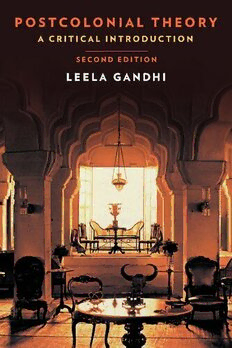
Postcolonial theory : a critical introduction PDF
Preview Postcolonial theory : a critical introduction
Postcolonial Theory Interior of Tuncum, Madurai by Edmund David Lyon, Prints and Drawings Section of the Oriental and India Office Collections, British Library (OIOC photo 1001 [2975]) Postcolonial Theory A Critical Introduction Second Edition Leela Gandhi Columbia University Press New York Columbia University Press Publishers Since 1893 New York Chichester, West Sussex cup.columbia.edu Copyright © 2019 Columbia University Press All rights reserved Library of Congress Cataloging-in-Publication Data Names: Gandhi, Leela, 1966- Title: Postcolonial theory : a critical introduction / Leela Gandhi. Description: Second Edition. | New York : Columbia University Press, [2018] | Previous edition: 1998. | Includes bibliographical references and index. Identifiers: LCCN 2018032553 (print) | LCCN 2018034095 (e-book) | ISBN 9780231548564 (e-book) | ISBN 9780231178389 (cloth : acid-free paper) | ISBN 9780231178396 (paperback) Subjects: LCSH: Postcolonialism. Classification: LCC JV51 (e-book) | LCC JV51 .G36 2018 (print) | DDC 325/.301—dc23 LC record available at https://lccn.loc.gov/2018032553 Columbia University Press books are printed on permanent and durable acid-free paper. Printed in the United States of America Cover design: Elliott S. Cairns Cover image: “Madura. The interior of the Tuncum.” Photograph by Edmund David Lyon, c. 1868. British Library, London, UK / © British Library Board. All Rights Reserved / Bridgeman Images. Contents Acknowledgments vii Preface to the Second Edition ix Preface to the First Edition xiii 1. After Colonialism 1 2. Thinking Otherwise: A Brief Intellectual History 23 3. Postcolonialism and the New Humanities 42 4. Edward Said and His Critics 64 5. Postcolonialism and Feminism 81 6. Imagining Community: The Question of Nationalism 102 7. One World: The Vision of Postnationalism 122 8. Postcolonial Literatures 141 9. The Limits of Postcolonial Theory 167 Epilogue: If This Were a Manifesto for Postcolonial Thinking 177 Bibliography 215 Index 255 v Acknowledgments F or the first edition of this book, I thank my former colleagues at La Trobe University and Elizabeth Weiss at Allen & Unwin. Thanks also to Marion Campbell, Dipesh Chakrabarty, Joanne Finkelstein, David Lloyd, Rajyashree Pandey, Sanjay Seth, and Ruth Vanita. Pauline Nestor and Bronte Adams gave much support and read through the initial manuscript with care and patience. For the second edition, I am grateful to my colleagues and students at Brown University for institutional support and for conversations that have enriched my understanding of post- colonial thinking. I thank Philip Leventhal and the editorial team at Columbia University Press for the opportunity to revisit the material of this book, as well as the two anonymous readers of this edition for their generous and generative suggestions. I presented versions of the new material in lectures at Ohio State University, Dartmouth College, Stanford University, the Centre for the Study of Developing Societies in Delhi, and the University of Oxford. I learned much from audience feedback on these occasions. I am full of gratitude to Tamara Chin, who has been a crucial interlocutor and mainstay. vii Preface to the Second Edition I n the late 1990s, when I began work on the first edition of this book, postcolonial theory was the domain of a handful of thinkers. It was very much an emer- gent field, in Raymond Williams’s sense of emergent, mean- ing something that is starting to stand apart from the status quo while being absorbed in the current. Early postcolonial- ism exposed the limits of academic Eurocentrism, but it did so as an adjunct to mainstream critical theory. It had a distinct humanistic idiom and methodology—more value based than positivist, though always with materialist deference to real events, people, places, pasts, and so on. Most practicing critics at the time came out of literature departments (predominantly comparative and Anglophone) and from conceptual branches of history and historiography. They used their considerable skills to speak in speculative rather than practical terms about the contemporary non-West. Finally, postcolonialism was party to—indeed, at the helm of—a new philosophical skepti- cism in some European and American scholarly systems, with offshoots in counterpart postcolonial settings. This last claim needs elaboration. ix
